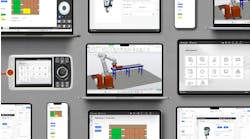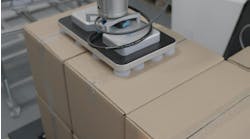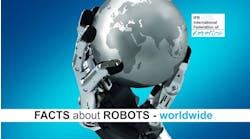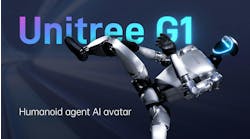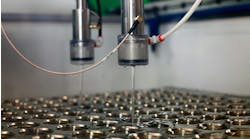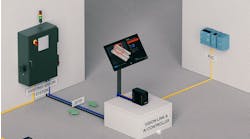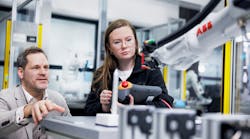Survey Reveals Re-Industrialization at Risk Due to Global “Education Gap”
A global ABB survey has revealed a growing trend in US and European businesses towards re-shoring or nearshoring operations to build resilience in the face of global challenges—but at the same time, a significant education gap in the skills necessary for these strategies to succeed.
“The world is constantly evolving—businesses are shifting existing structures and adopting new technologies to future-proof their operations for a variety of challenges and uncertainties, with robotic automation playing a key role,” said Sami Atiya, President of ABB’s Robotics & Discrete Automation Business.
“We need significant investment in continuous education to prepare our existing and future workforce to thrive in an age of robotics and automation, important not only to prepare for the widespread shifts we are seeing but to create prosperous societies going forward.”
ABB’s 2022 survey of U.S. and European business leaders revealed that 74% of European and 70% of U.S. businesses are planning to reshore or nearshore operations to build their supply chain resilience in response to labor shortages, the need for a more sustainable global footprint, and global uncertainty.
The majority of these businesses view automation as the enabler of these shifts, with 75 percent of European and 62 percent of US businesses surveyed planning to invest in robotics and automation in the next three years to facilitate this shift in operations.
Despite this appetite for automation, ABB’s 2022 global education survey found a significant gap in the education and training needed to ensure the skills necessary for work in the increasingly connected and automated workplaces of the future. Of the global education professionals surveyed, 80% believe robotics and automation will shape the future of employment in the next ten years, while only one in four education institutions currently use robots as part of their teaching programs.
To help bridge the skills gap, ABB has bolstered its global Robotics and Automation education program with new training centers, including its EUR 100m global innovation and training campus in Austria. The new site, along with other new regional training centers in the U.K., Berlin, and Brazil expands ABB’s training facilities to over 40 sites globally, educating more than 30,000 students from schools, colleges, and universities, as well as apprentices and workers each year.
The sites add to ABB’s existing educational offering, which consists of software packages, including ABB’s Wizard Easy programming, RobotStudio, and RobotStudio AR Viewer App, as well as hardware in the form of collaborative robot cells and application packages. Through more than 100 global partnerships with schools and universities, ABB generates curriculum materials with education providers to help educate future generations and prepare them for the jobs of tomorrow.
“Change needs to happen now,” added Atiya. “As companies turn to robotic automation to offset labor shortages, improve efficiency and increase resilience, workers need the skillsets to use automation to perform their jobs and augment their own roles. Businesses need to join forces, cooperating with educational institutions and Governments to ensure that society is prepared for jobs of the future. Only through this can we fully utilize flexible automation and unlock value from the ongoing re-industrialization.”
ABB’s survey highlights the critical need to promote the teaching of robotics and automation skills. For more information, including ABB’s offering for education, examples of educational projects involving ABB and its robots and software, and a white paper explaining how teaching automation can help shape tomorrow's workforce, visit the ABB education portal page.
Investment, Impact for the Future
As the world enters a new age of robotics, Illinois State University in Normal, Illinois USA is a proven industry leader using ABB robotics and software to train tomorrow’s workforce.
The Application:
The Department of Technology at Illinois State University (ISU) trains students to program and operate industrial robots in preparation for careers in the industry.
The Challenge:
The rapid increase of robot orders by U.S. companies requires people to have the skills that enable them to operate and maintain robotic products, systems, and software. Academic institutions play a significant role in the job market. To meet the rising demand, universities and technical colleges are investing in robotics to further prepare their students for the future workforce.
The Solution:
ISU’s partnership with ABB Robotics provides a robust training program with industry-leading technology and curriculum support. Current and future ISU students will graduate with the skills they need to succeed in the future of the industry and robotic automation.
The Changing Landscape in Education
As robotics and industrial automation are on the rise, so is the demand for engineers and qualified technicians in the industry. The U.S. has seen significant growth in demand for robots as companies look for ways to meet the challenges caused by a rising shortage of available labor.
According to figures from the Association for Advancing Automation, a record 39,708 robots were sold in the U.S. in 2021, with non-automotive companies in sectors such as metals, food and beverage, plastics and rubber, and others accounting for 58% of the total demand. In many cases, these companies are using robots to handle jobs that are dirty dangerous, dull, and hard to fill due to the lack of skilled labor.
“One trend that I think we're seeing clearly is an increased demand for our graduates, said Dr. Kevin Devine, College of Applied Science and Technology Professor, Department of Technology, ISU. “The industry is clamoring right now for qualified people and we're having a lot of trouble meeting that need.”
Educational institutions are emphasizing a focus on Science, Technology, Engineering, and Mathematics (STEM) subjects so that current and future generations are able to solve the most pressing problems in industry and help create a more sustainable future.
ISU’s investment in robotics has proven to support student innovation, creativity, and technical advancements. Their program has attracted students from around the world and re-invigorated the classroom experience through their ABB-supported robot lab and offline programming tools.
“We give our lab the feeling of a training environment to resemble the workplace,” said Professor Jeritt Williams, Department of Technology at ISU. “We have a work cell with authentic equipment, materials, and real-world situations that they'll be using in their careers.”
The lab features an array of ABB robots and software to provide students with the experience and knowledge of industry 4.0 and smart manufacturing technologies. One of the tools available is ABB’s RobotStudio offline programming software, which enables different robotic solutions to be created and simulated in a virtual environment before applying them in the real world. ABB offers up to 100 licenses free of charge to universities and colleges.
“The RobotStudio software product is a powerful learning tool that ABB provides at no cost to educational institutions that use their robots,” said Dr. Devine. “The graphics programming capabilities of RobotStudio are fantastic. I have my students create and program their robot work cell in a virtual space using RobotStudio which they can then download and run-on real robots.”
“One thing I’ve noticed about ABB and RobotStudio is that it provides students with the opportunity to engage in a virtual world that they’re used to,” said Professor Williams. “The virtual world in RobotStudio reflects exactly what the students are doing in the live environment. We work with authentic equipment, materials, and techniques and apply them to real-world situations that our students will use and encounter in their careers.”
Training for Educators
The key to the effectiveness of the teaching program is ABB’s Software, Maintenance, and Robotics Training (SMART) certification program for STEM. This program certifies educators to effectively implement, teach, and certify their students on ABB’s curriculum.
The program guides educators through the tool with hands-on examples and interactive labs that boost student engagement and success. The SMART certification program enables ISU’s staff to access ongoing training and help enhance their own knowledge.
“I have been impressed with the quality of the technical support and training provided by ABB,” said Dr. Devine. “I have attended three training classes conducted by ABB and learned a great deal in each class. “If I have questions about anything, technical support personnel are glad to help.”
It’s safe to say this is an exciting time for students, educators, and manufacturers alike.
